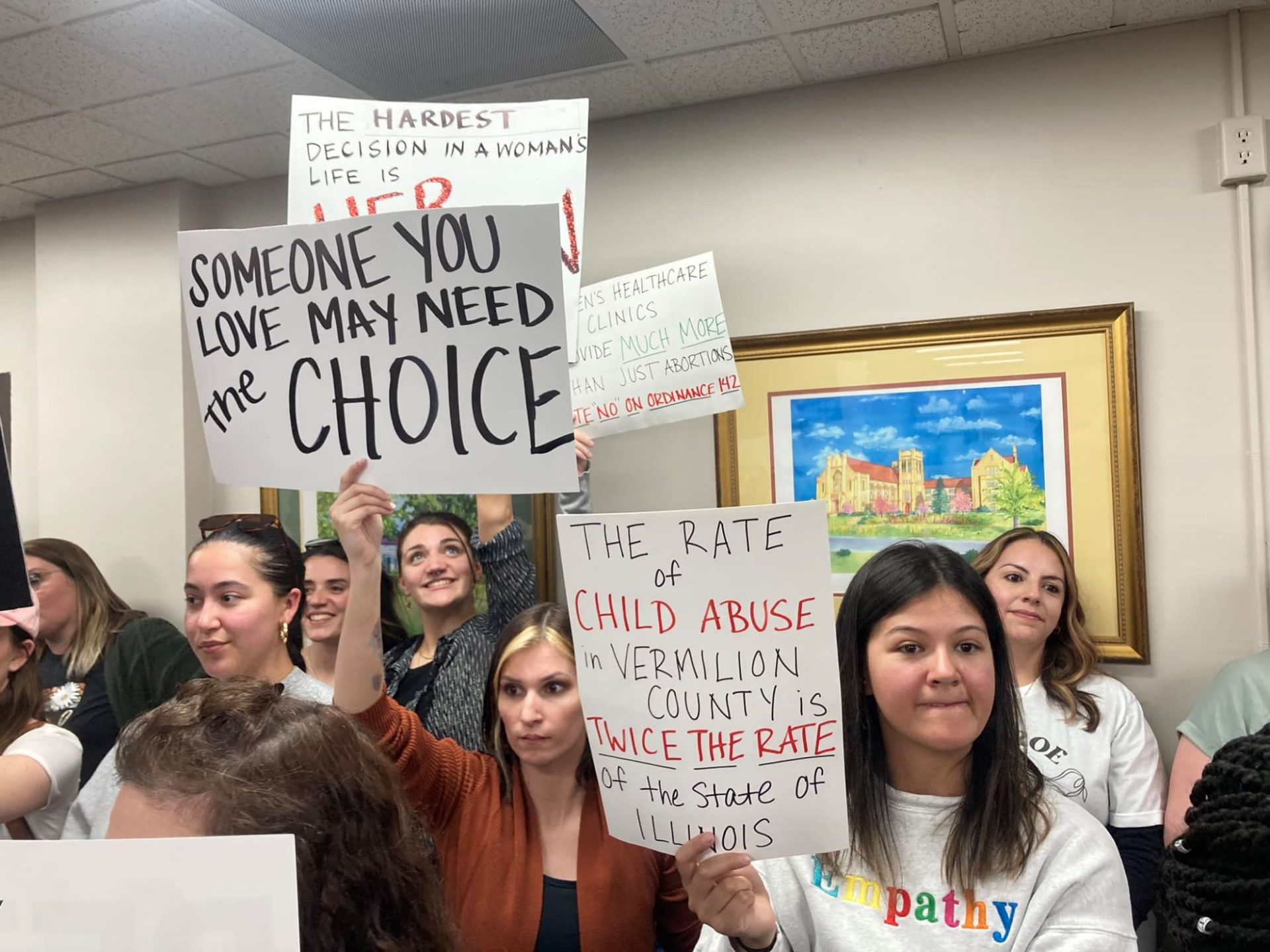This Editorial Board has spoken at length about the importance of showing up to vote in local elections. It’s a thread that ran through our recent editorial with our thoughts on the consolidated election in Champaign County. Local elections are not always as flashy, as they tend to lack money from big donors as a U.S. House race might. They are “non-partisan,” so you have to do a bit more research into each candidate rather than relying on their party affiliation to have some inclination of where their values lie. Yet, these elected officials have the ability to make the most significant impact on our daily lives.
We are seeing this idea play out in real time with our neighbors just 40 miles to the east. Last week, the Danville City Council passed an ordinance with the intention of preventing their citizens from having the access to abortion that is afforded to them by the laws of the State of Illinois. From Smile Politely contributer Barbara Kessel, who attended the meeting:
The ordinance draws on 19th century federal laws, and would ban shipping and sales of medicines and paraphernalia used in abortion care within the City of Danville. The move came in response to a women’s clinic attempting to relocate from Indianapolis to Danville. The clinic would offer abortion care in addition to a range of other reproductive healthcare.
The vote among City Council members was a 7-7 tie, with Mayor Rickey Williams, Jr. stepping in to cast the deciding yes vote. Eight people in a city of nearly 30,000 — which, of course, does not include the other people in Vermillion County and surrounding areas that would rely on these services — made a decision that could have a grave effect on the health and wellbeing of people in the community. In the April 4th election, out of 28,730 registered voters in Vermillion County, 5,204 ballots were cast. That’s an 18% turnout. Williams received just over 2,000 votes to win re-election as mayor. The City Council is divided into seven wards, with two aldermen from each ward, meaning those people get elected to their seats with even fewer votes.
These are small elections with big stakes.
Those who represent Danville in other jurisdictions have spoken up against the ordinance, including Congresswoman Robin Kelly (IL-02), and State Senator Paul Faraci (D-Champaign). Illinois Attorney General Kwame Raoul sent a warning to Mayor Williams prior to the vote, noting that the ordinance would violate the Illinois Reproductive Healthcare Act. Governor Pritzker echoed that sentiment in a statement, reiterating that the law “explicitly bars local governments from restricting abortion rights.”
It should be noted that there was a provision added to the ordinance before its passage, stating that it could not go into effect unless there was a “declaratory judgment from a court,” in an attempt to stave off any legal challenges. According to reporting from Illinois Newsroom, should a court deem the ordinance lawful, “Mayor Rickey Williams, Jr. says the ordinance would be enforced by local law enforcement which would operate off of tips from the community.” That’s right: neighbors telling on neighbors.
We don’t need to go into the myriad ways that lack of access to medical and surgical abortions can negatively impact the health of women and those assigned female at birth. We’ve detailed the many barriers that still exist to abortion access in the state of Illinois, despite our progressive state laws. Should this ordinance take hold for any period of time, it will be to the detriment of a population already lacking access to needed healthcare. Last fall, OSF Sacred Heart Danville, the only hospital in Danville, discontinued labor and delivery services. An article from Commercial-News refers to an OBGYN that spoke up against the ordinance, Dr. Bethany Halloran, as the “only obstetrics and gynecology physician [in Danville] who cares for women and their babies during pregnancy and childbirth” [emphasis ours]. Danville’s population is 34% Black, and it is well-documented that Black women have much higher maternal mortality rates than white women. Thirty percent of Danville’s citizens live in poverty. With poverty come things like transportation difficulties and difficulty obtaining childcare. The City Council chose to risk millions of dollars in legal fees with an unlawful ordinance, rather than consider the prescient needs of their community.
There’s a grassroots effort afoot surrounding the opposition to this ordinance, led by the local Democratic Party and a new organization, Vermillion County Pride Coalition. The group recently formed around the planning of the area’s first pride celebration, but realized they could use their platform for this as well. Says board member Lacy Miller, “Reproductive rights are very important to all of us, so it made sense to us to use that platform to organize and use our voices. To us, pride is political and we want to be an organization that will be a resource for human rights issues that impact Vermilion County and beyond.”
They plan to keep the pressure on local officials, and hope to motivate more to become involved in pushing for change in local government. If you are interested in becoming more involved, and supporting their work, you can follow them on Facebook. The next Danville City Council meeting is May 16th at 6 p.m., if you want to join other activists there.
The Editorial Board is Jessica Hammie, Julie McClure, Patrick Singer, and Mara Thacker.








